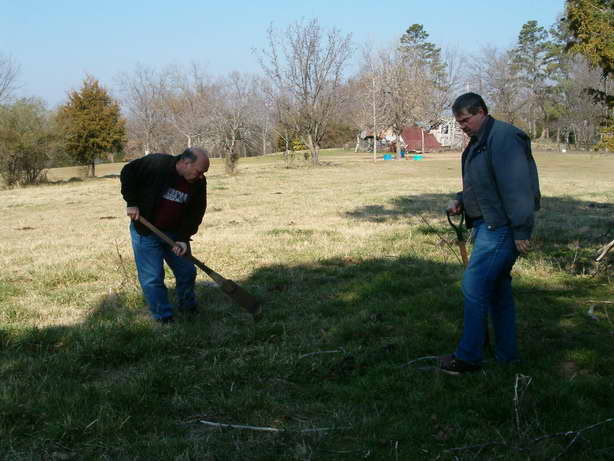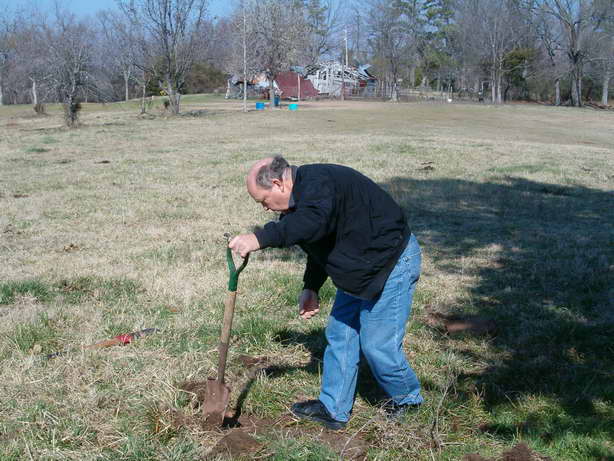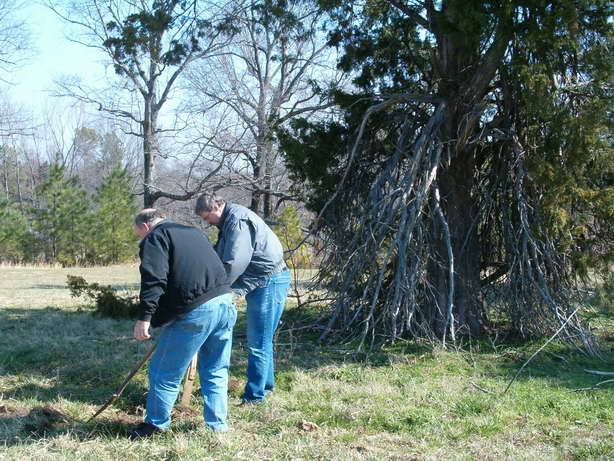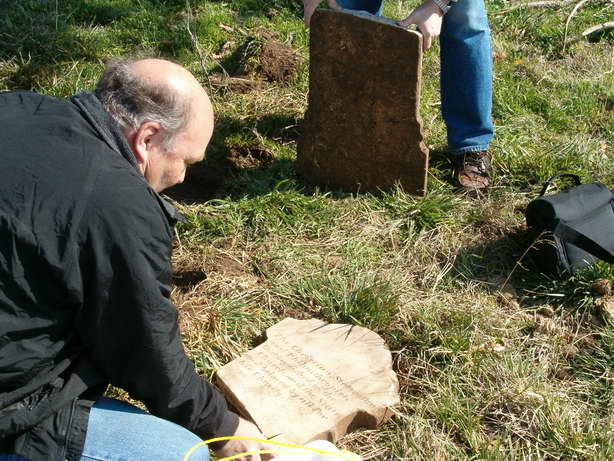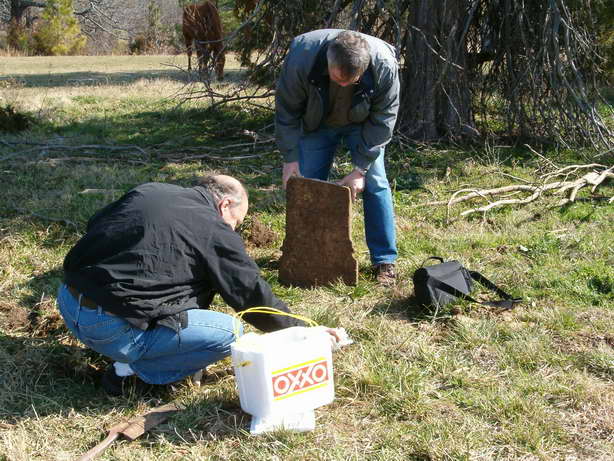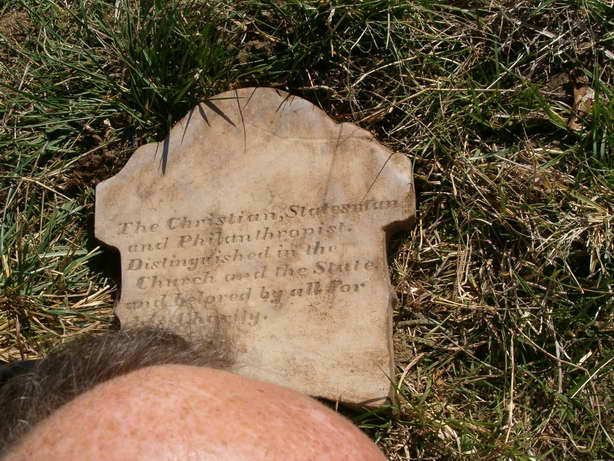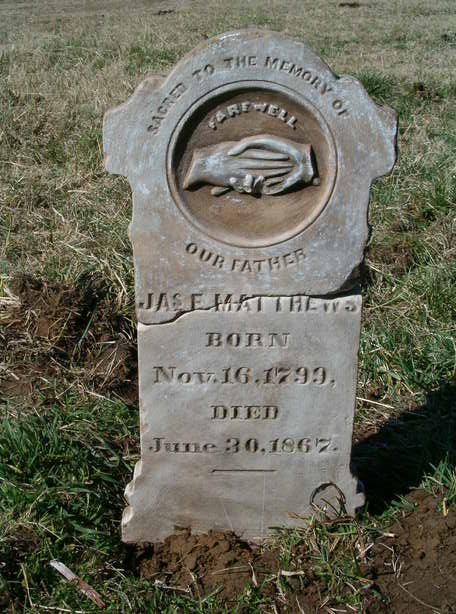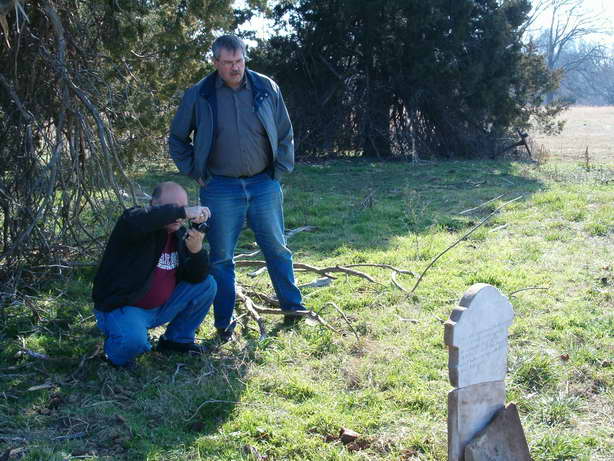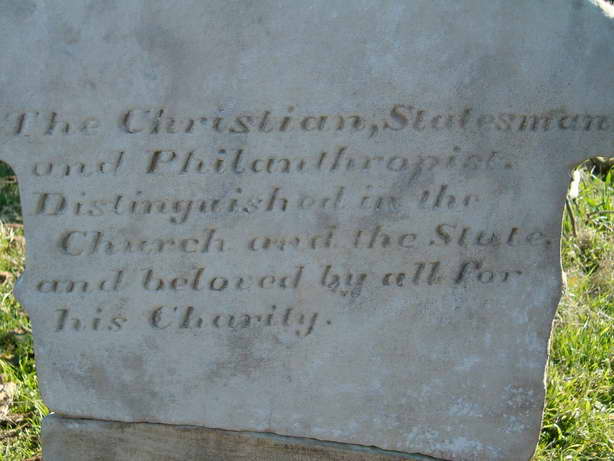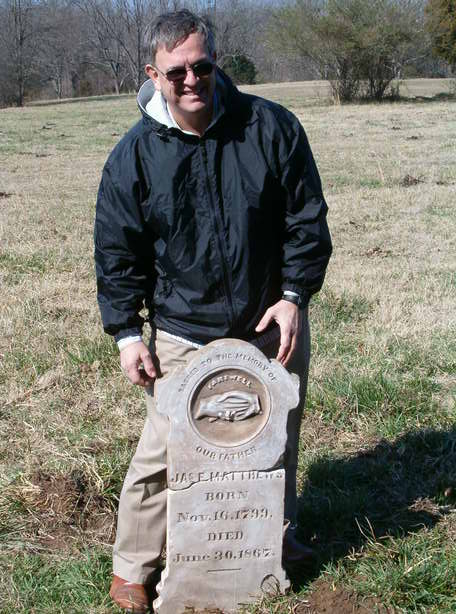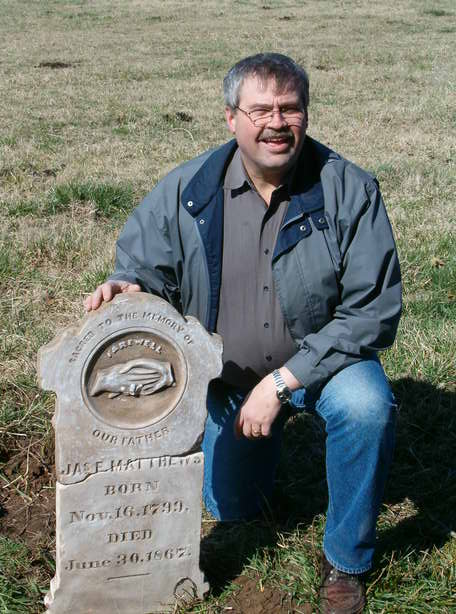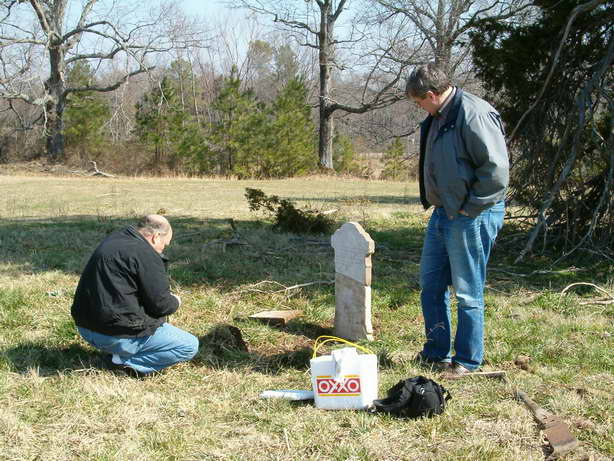James Evans Matthews
(1799-1867)
Gospel Preacher, Politician In Mississippi
His most notable contribution to the Restoration Movement was baptizing Tolbert Fanning, the great evangelist and founder of The Gospel Advocate. His brother, Mansell W. Matthews was one of the first preachers of the old time gospel in the state of Texas.
His most notable contribution to the Restoration Movement was baptizing While living in Lauderdale County, Alabama in the mid 1820s, he preached at the old Republican church. (now Stoney Point Church of Christ). He came under the influence of B.F. Hall who was teaching an aspect of the gospel not previously taught by Matthews. Hall came into North Alabama teaching that baptism was essential to the remission of sins. His influence of Matthews ultimately led to articles written by Matthews on baptism that were sent to the Christian Messenger for publication. In the 1830s he moved to the state of Mississippi, preaching and planting congregations of the New Testament Church in the northwestern part of that state. He worked with many of Mississippi's great preachers such as T.W. Caskey, General William Clark, and B.F. Manire.
Matthews was involved in politics in that state spending much time in Jackson, the state capitol. He preached the old time gospel until his death June 30, 1867. See more in-depth sketch below.
![]()
Biographical Sketch On The Life Of James E. Matthews
Some of the pioneers are entirely forgotten and the young generation know nothing about the labors which they did and the sacrifices which they made. Again, some of the pioneers did noble service in comparative obscurity. Few Tennesseans know the second governor of Tennessee; and those who do know anything of him know him, not from the work that he did as governor, but his work as a teacher. Archibald Roane, the second governor of Tennessee, is known as the teacher of the great statesman, Hugh L. White. Andrew, one among the first of our Lord's disciples, is known more generally because of the fact that he brought his brother, Peter, to the Savior. So James E. Matthews is known as the preacher who baptized Tolbert Fanning.
James E. Matthews was born in Kentucky in the year 1799, and lived there until he reached his majority. In early life he became acquainted with the religious views of Barton W. Stone, and about the age of twenty-five he was baptized by one of the associates of that distinguished servant of God. Soon after his profession of Christianity he began proclaiming the gospel of Christ, and from the year 1827 until the day of his death he ceased not to proclaim the unsearchable riches of Christ as the Redeemer of man. His labors were confined to the States of Mississippi and Alabama. He had made the former his home from early manhood.
Tolbert Fanning, who was a good judge of men, pays the following tribute to him: "Perhaps, for no man, since the departure of our own father, did we feel a more tender regard than for our deceased brother. He was the teacher of our early youth, our instructor in the Christian religion in riper years, and, upon an understanding confession of the faith, with his own hand he baptized us into the name of the Father, Son, and Holy Spirit, October, 1827. Brother Matthews was but little known out of the States of Alabama and Mississippi; but where known, his distinguished ability was felt and acknowledged, both as a preacher and a statesman. As an intellectual man, we doubt whether we ever knew his superior, and had he been in circumstances to call forth his great powers of faith, he would, evidently, have been regarded as one of the tall giants of earth." (Gospel Advocate, 1867, page 618).
James E. Matthews took an active part in the politics of his adopted State. He was elected as a member of the Legislature of Mississippi, and held the office of Auditor of Public Accounts and other State offices. Tolbert Fanning says in regard to his holding office, that "his influence was somewhat marred by the deceitful net of political preferment." It may be said truly of him that he sought no political honor, but that the honors sought him because of his ability and integrity as a true Christian gentleman. He was acknowledged by his fellow citizens to be a truly great man. He was conscious of their respect for the estimate of him, but he ever remained humble as a little child.
He was clear and pointed in his preaching and public speaking. His command of the best words to express his ideas was wonderful. He was very eloquent, and those who heard him speak have said that they lost sight sometimes of his theme in thinking only of his beautiful sentences and appropriate words and phrases. He made frequent visits on preaching tours in Mississippi and Alabama. It was on one of his preaching tours in Northern Alabama, near Florence, that the young man, Tolbert Fanning, heard him and by him was baptized into Christ. President W. J. Barbee, who knew him well, said: "He was beyond doubt one of the most gifted men in defense of the gospel of Christ I ever heard. He was bold, intelligent, logical. His positions were well taken, his points arranged in fine order, his arguments constructed and elaborated with precision, and his conclusions rendered inevitable. He was preeminently a Bible man, and advocated unison upon the word of God, upon Christ, having regard to difference of opinion."
As pioneer preacher, he endured hardships and labored incessantly. He addressed great multitudes of people in groves, barns, storehouses, as well as in courthouses and town halls; wherever he could get a hearing he preached the gospel. He established many congregations throughout Mississippi and Alabama, baptizing thousands of people into Christ. He preached the gospel with power and eloquence, not fearing the opinions of men nor seeking to be a pleaser of men. His boldness, together with his ability in preaching the gospel, made him a great power among the people. Denominations feared him, yet respected him for his humility and thorough knowledge of the word of God. He had no debates with his religious enemies, because they were not willing to meet him and oppose his preaching the truth of God. He moved among the denominations as a lion moves among the beasts of the forest; none opposed, but all got out of his way. He traveled horseback and often went on foot, always carrying with him his saddlebag, which contained a few undergarments for a change.
Sometimes he preached for two hours; in fact, this was the usual length of his sermons; however, he was never tiresome, but held the attention of his audience to the close. The people heard him gladly; he spoke eloquently so that they understood him. These were the days of long sermons and basket dinners. The people had but little social advantages then, except in such gatherings. It seems that they were more susceptible to the teachings of the Bible than people are today. They were a simple folk, with but few disturbances in their community and but little to occupy their minds, save the simple routine of daily affairs and the profound truths revealed in God's word. The people lived a simple life and were happier than the people of this fast age. His converts were counted by the hundred wherever he went.
The latter part of his life was given more to the service of his State, and while he was largely engrossed in political affairs, yet he never deserted his King; and whether in the counsels of his country or in the pulpit preaching the gospel, he was a model man. His friends in the church would have been better pleased had he given his entire time unto the end of his earth life to the preaching of the gospel. He died at the age of sixty-eight, in Desoto County, Miss., June 30, 1867.
-From Biographical Sketches Of Gospel Preachers, H. Leo Boles, Gospel Advocate Company, Nashville, Tennessee, 1932, pages 100-102
![]()
Gospel Advocate Obituary
Died, at his residence in DeSoto county, Miss., on Lord's day, June the 30th, 1867, James E. Matthews, in the 68th year of his age. He died in the triumphs of faith and hope. Perhaps, for no man, since the departure of our own father, did we feel a more tender regard than for our deceased brother. He was the teacher of our early youth, our instructor in the Christian religion in riper years, and, upon an understanding confession of the faith, with his own hands, he baptized us into the name of Father, Son and Holy Spirit, October, 1827. Brother Matthews was but little known out of the States of Alabama and Mississippi, but where known, his distinguished ability was felt and acknowledged, both as a preacher and statesman. As an intellectual man, we doubt whether we ever knew his superior, and had he been in circumstances to call forth his great powers of faith, he would, evidently, have been regarded as one of the tall giants of earth. His influence was somewhat marred by deceitful net of political preferment; but in his long life, he never deserted, or slighted the banner of our King, and whether in the counsels of his country, or laboring as a minister of peace, he was a model man, always doing good.
-Tolbert Fanning - Gospel Advocate August 1, 1867, page 618.
![]()
Location Of Grave
J.E. Matthews is buried in the Bucey-Matthews Cemetery, near the small town of Crockett, Tate County, Mississippi
From Memphis, Tennessee:Go about 32 miles south from Memphis on Interstate Hwy. 55. Take Exit No. 265 (Senatobia). Go west on Hwy. 4 (Main Street) for 1 mile into Senatobia. From downtown Senatobia, continue west on Hwy. 4 forabout 7 miles. This is the Crockett community. The Crockett Church of Christ building is located nearby. (Note: The Strayhorn community is 3 miles further west on Hwy. 4. If you reach Strayhorn, you have gone too far.) The Matthews cemetery is located south of Hwy. 4 on the J. P. Boling farm (as of 1990). The address is J. P. Boling, 7978 Hwy. 4 West, Senatobia, MS 38668. The Boling farmhouse is a white house located close to the highway, seemingly on a slight elevation about the road. Pull into driveway and notify landowners that you would like to visit cemetery. There is a gate, south of the house, going into the pasture behind. The cemetery is located in a grove of cedar trees, maybe 500 to 600 feet southeast of the farmhouse. In 1990, the site was in the middle of a well-maintained coastal field, making it an easy walk or drive from the farmhouse. Only a few stones survive. In 1990, James E. Matthews' was broken, laying flat on the ground.
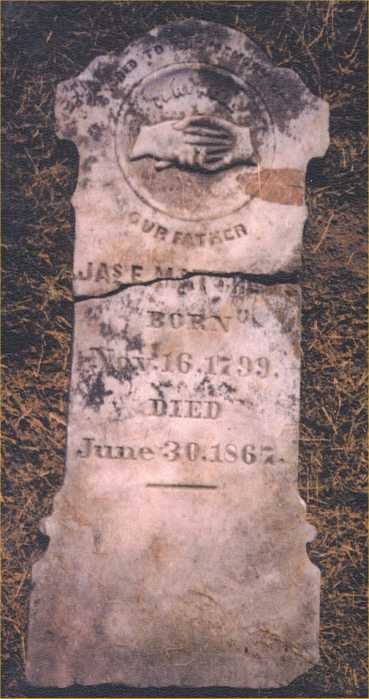
Webmaster Note: Special thanks to Terry Cowan, descendent and Matthews family member who has helped to find the grave, and whose provided information made this page possible.
![]()
Finding The Grave Of James Matthews . . . Again!
In March, 2006, I had the opportunity to travel with Wayne Kilpatrick and Gary Roeder over to Tate County, Mississippi to find the grave of J.E. Matthews. Until that point we had only known of its location through correspondence with Terry Cowan. When we arrived at the location, we soon felt a deep feeling of discouragement at the fact that there were no graves in the cemetery to be found. The small cemetery was part of a pasture that had a number of horses in it. The graveyard had no markers exposed, as if there was no cemetery there at all. As we were not certain where the graves were, we began looking for a logical area of where the graves may have been. We walked all over the pasture looking, but finally settled on an area around some trees. After looking closely a corner of a stone was found. Cleaning around it we found it was a grave marker, but not the one of James E. Matthews. Over the next hour we took shovels from a local barn, and we began slicing into the ground as deeply as we could to see if we might stumble upon the grave marker for which we searched.
As we were about to give up, never to locate the marker at all, we proceeded to look in one more location. We pressed into the ground a couple of times and hit a hard substance about six to eight inches below the ground. We began digging around the object. After carefully removing the dirt, our goal was realized much to our deep thankfulness.
The preservation of this location is in deep peril, as the location is still very much forgotten. As this man was greatly beloved among the church during his day, and served as a statesman in the state of Mississippi, something needs to be done to preserve this location. Efforts are being made presently, so that it will be preserved for generations to come.
Sacred to the Memory Of
Farewell
Our Father
Jas E. Matthews
Born
Nov. 16, 1799,
Died
June 30, 1867
The Christian, Statesman
and Philanthropist.
Distinguished in the
Church and the State,
and beloved by all for
his Charity.
Gary Roeder Behind Matthews Monument
Scott Harp Behind Matthews Monument
Wayne Kilpatrick (L) and Scott Harp (R)
![]()
